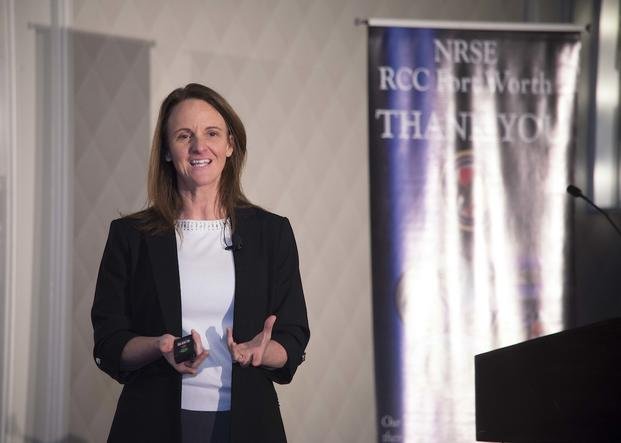Other people dream of falling off a cliff. Their nightmares feature running away from an attacker, losing all their teeth or sitting down to take a final at a class they never attended.
My nightmare is standing in front of a crowd of military spouses so bored they all pull out their smartphones the minute they lay eyes on me.
This is fairly terrifying.
So when I talk to people who are going to speak in front of military spouses, they are often shocked that I’m not looking for a 45-minute PowerPoint presentation for our audience of boots-on-the-ground military family professionals.
I’m not. Really.
Because PowerPoint is the #1 way NOT to speak to military spouses. I have noticed how military spouses don’t want anyone to read to them. They don’t want a speaker to say anything they can Google on their own. They don't want anyone to squander the very precious minutes we spend somewhere in person.
That’s true for everyone, not just military spouses. That's why I think there is a trend in the conference world toward shorter, tighter, more inspiring speeches.
So I started putting together some tips for our pool of presenters. We want to help others figure out how to design the kind of event that makes our military family professionals remember why they love their work.
1.Think of just one thing. If you were jumping off a cliff and only had enough time to say one thing to this audience, what would it be? What idea about your work or our community would you want them to drive home pondering? What step would you want them to take?
2. Tell me a story. We know a lot of facts about military life. We can’t possibly be aware of all 46,000 nonprofit organizations that list “military” in their mission statement with the IRS. So tell us a story that brings a program to life. Tell me about someone you saved. Tell me something that makes me believe in myself. Show me how I can apply your success to my own program.
3. What is your expert opinion? We already know you are the expert. We read your bio in the program. We read an article you wrote last year. What we don’t know is what makes you curious? What breaks your heart? What makes you want to stomp on your phone with fury? What did you try that failed? What did you try that worked so much better than you ever dreamed of?
4. Let the audience speak. A lot of people think that the only time an audience ought to talk is during that five minute period of Q&A at the end of a speech. Research on adult education shows that an audience has an attention of about five minutes for another adult’s uninterrupted speech. So let them talk. Let them talk in twos and threes and tables to root your idea in their lives. Audiences say that one reason they come to conference is meet and network with other people. Give them a chance.
5. Steal from the rich. No one is asking you to invent a way to give a shorter speech. The creatively rich have already done that for you. Get a better idea of the short speech format by watching some TED Talks.
6. Steal from the Japanese. Check out PechaKucha -- a kind of short presentation going like gangbusters in Japan. Each speaker shows 20 slides for 20 seconds each.
7. Steal from the greatest. Get your speaker groove on by watching the greatest short speeches of all time like the Gettysburg Address. Or Churchill's "never give up: speech. Or Kid President’s Pep Talk.
8. Keep it short. Really, really short.
9. Make it shorter and tighter than that. TED talks are limited to 18 minutes at most. Some of the best are only 6 minutes. Or 3 minutes. As they tell TED talkers: Get up. Get done. Take questions.
10. Mingle. Before and after your presentation, talk to the individuals who make up your audience. In post-event surveys, today’s audiences say that what they want is a little access to the experts. I always do this. Not because I am an expert on anything, but because it gives me one more chance to make sure I understand who is present so that I am sending the best message. And I always appreciate a friendly face in the audience.
My workmates say that maybe it would be easier for presenters to slog through their 45-minute PowerPoint than try something new. I don’t really think that is true. I think there is something soul-sucking about standing in front of people and just filling time.
Instead, I think that getting together at a conference in person offers something to both speakers and participants that we can’t get any other way.
So, if you’re going to speak to military spouses, take on this challenge because all of us who work with military families are learning to do more with less. We’re a little worn around the edges. We need to get together for comfort and motivation and that divine creative spark. We are counting on you. The way everyone is counting on us.
Keep Up with the Ins and Outs of Military Life
For the latest military news and tips on military family benefits and more, subscribe to Military.com and have the information you need delivered directly to your inbox.










